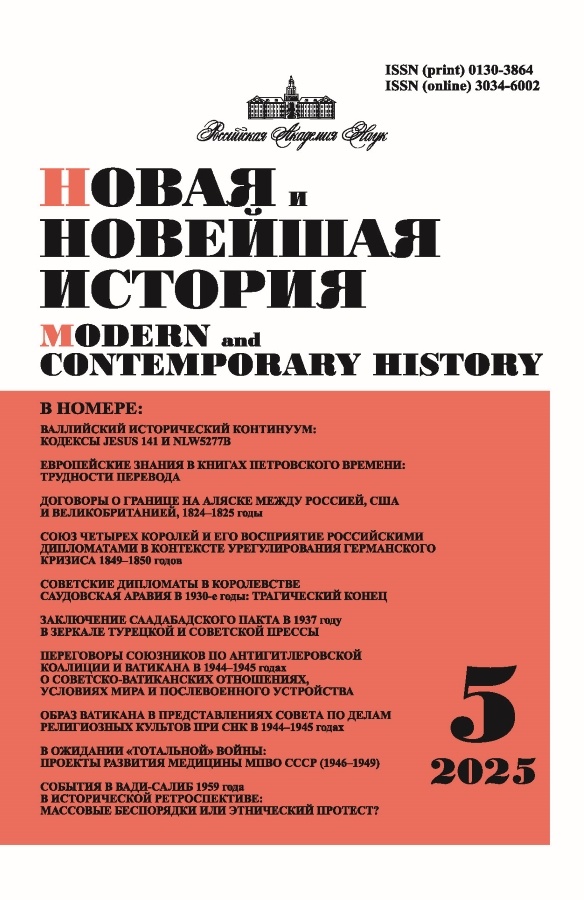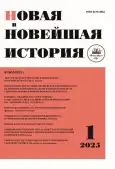Идеологические истоки европейского колониализма. На примере кампании по делегитимации регентств Северной Африки в период Венского конгресса
- Авторы: Жерлицына Н.А.1
-
Учреждения:
- Институт Африки РАН
- Выпуск: № 1 (2025)
- Страницы: 74-84
- Раздел: Новое время
- URL: https://gynecology.orscience.ru/0130-3864/article/view/679441
- DOI: https://doi.org/10.31857/S0130386425010061
- ID: 679441
Цитировать
Полный текст
Аннотация
Венский конгресс 1814 г. стал для Европы значимым рубежом перехода к новой системе международных отношений, в основании которой лежала западноцентристская теория прогресса. Мусульманские страны южного берега Средиземного моря, регентства Алжир, Тунис и Триполи, оказались за пределами этой новой системы, которая санкционировала отмену их суверенитета и интервенционистскую политику по отношении к ним. Исследования истоков европейского колониализма, развенчания сложившихся в XVIII–XIX вв. в европейской политике и культуре уничижительных стереотипов в отношении мусульманских стран и ислама, империалистических по своей природе, приобретают ныне особую актуальность. Новизна исследования – в демонстрации тесной связи между новой западноцентричной идеологией, воцарившейся в Европе после 1814 г., и практикой – насильственным вмешательством в дела стран Северной Африки и, в конечном счете, их колонизацией. Источниками для данного исследования выступили работы европейских философов и политических активистов конца XVIII – начала XIX в., печатные издания той эпохи, материалы Архива внешней политики Российской империи. Использованная в статье историография включает работы как основоположника темы ориентализма Э.В. Саида, так и современных авторов, как российских, так и западных, посвященные теме истоков колониализма. Автор пришел к выводу, что Венский конгресс стал этапным событием в отношениях Европы и стран Северной Африки: именно тогда был поставлен под сомнение правовой статус стран региона, что в будущем привело к их колонизации.
Ключевые слова
Полный текст
Об авторах
Наталья Александровна Жерлицына
Институт Африки РАН
Автор, ответственный за переписку.
Email: lab95rum@mail.ru
ORCID iD: 0000-0001-8647-9419
Scopus Author ID: 57202786350
ResearcherId: AAZ-3955-2020
доктор исторических наук, ведущий научный сотрудник
Россия, МоскваСписок литературы
- Мигаль А.С. Концепт «восточный деспотизм» в представлениях французских просветителей о мусульманском Востоке // Научный диалог. 2015. № 11 (47). С. 150–162.
- Монтескье Ш.Л. О духе законов. М., 1999.
- Прожогина С.В. Пассеизм и тревога за будущее (магрибинцы о себе и о мире) // Азия и Африка сегодня. 2020. № 10. С. 74–77.
- Саид Э.В. Культура и империализм. СПб., 2012.
- Migal A.S. Kontsept “vostochniy despotism” v predstavleniyakh frantsuzskikh prosvetiteley o musulmanskom vostoke [The concept of “Oriental despotism” in the ideas of French enlighteners about the Muslim East] // Nauchnyj dialog [Scientific dialogue]. 2015. № 11 (47). S. 150–162. (In Russ.)
- Montesquieu S.L. O dukhe zakonov [On the spirit of laws]. Moskva, 1999. (In Russ.)
- Prozhogina S.V. Passeizm i trevoga za budushee (magribintsi o sebe i mire) [Passeism and anxiety for the future (Maghreb people about themselves and the world)] // Asia and Africa today. 2020. № 10. S. 74–77. (In Russ.)
- Said E.V. Kultura i imperialism [Culture and Imperialism]. Sankt-Peterburg, 2012. (In Russ.)
- Bono S. Les corsaires en Méditerranée. Paris, 1998.
- Chater K. Dépendance et mutations pré-coloniales: la Régence de Tunis de 1815 à 1857. Tunis, 1984.
- Condorcet M.J. Esquisse d’un tableau historique des progre`s de l’esprit humain. In Oeuvres completes de Condorcet. Vol. 8. Paris, 1804.
- Cutter N. Peace with Pirates? Maghrebi Maritime Combat, Diplomacy, and Trade in English Periodical News, 1622–1714 // Humanities. 2019. № 8 (4). Аrticle № 179. URL: https://www.mdpi.com/2076-0787/8/4/179 (access date: 27.06.2024).
- Greene M. А. Shared World: Christians and Muslims in the Early Modern Mediterranean. Princeton, 2000.
- Hermann F. Ueber die Seeräuber im Mittelmeer und ihre Vertilgung: Ein Völkerwunsch an den erlauchten Kongreß in Wien. Lübeck, 1815.
- Holland R. Blue-water Empire: The British in the Mediterranean since 1800. London, 2012.
- Merouche L. Recherches sur l’Algérie à l’époque ottoman. Vol. 2. La course: Mythes et réalité. Saint-Denis, 2007.
- Panzac D. Barbary corsairs: The end of a legend, 1800–1820. Leiden, 2005.
- Pitts J. A turn to Empire: the rise of imperial liberalism in Britain and France. Princeton, 2005.
- Politics and the Press, 1780–1850 / ed. A. Aspinall. London, 1949.
- Richter M. Tocqueville on Algeria // The Review of Politics. 1963. Vol. 25. № 3. P. 362–398.
- Schulz M. The construction of a culture of peace in post-Napoleonic Europe: Peace through equilibrium, law and new forms of communicative interaction // Journal of Modern European History. 2015. № 13 (4). Р. 464–474.
- Smith W. Mémoire sur la nécessité et les moyens de faire cesser les pirateries des états barbaresques. London, 1814.
- Talbot M. British-Ottoman Relations, 1661–1807. Commerce and Diplomatic Practice in Eighteenth-Century Istanbul. Woodbridge, 2017.
- Tidemann F. Wass könnte für Europa in Wien geschehen? Beantwortet durch einen Deutschen. [S.l.], 1814.
- Tocqueville A. Deuxième Lettre sur l’Algèrie. Paris, 1837.
- Vec M. Universalization, Particularization, and Discrimination. European Perspectives on a Cultural History of 19th century International Law // Inter Disciplines. 2012. № 2. Р. 79–102.
- Vick B.E. The Congress of Vienna. Power and Politics after Napoleon. Cambridge (MA), 2014.
- Weiss G. Captives and Corsairs: France and Slavery in the Early Modern Mediterranean. Stanford (CA), 2011.
- Windler C. La diplomatie comme experience de l’Autre. Consuls francais au Maghreb (1700–1840). Geneva, 2002.
Дополнительные файлы








